World of Work: Understanding Motivation - BSc Business Management
VerifiedAdded on 2023/06/05
|7
|2019
|305
Report
AI Summary
This report explores the concept of motivation in the workplace, focusing on factors that drive employees and the impact of both positive and negative experiences. It discusses Maslow's hierarchy of needs and examines motivators such as promotion, salary, and development opportunities. The report further analyses positive factors like career growth and leadership skill development, as well as negative factors like unrealistic targets and unhealthy competition. It concludes by recommending strategies to improve the work environment, implement productive incentive schemes, and adopt democratic leadership styles to foster employee satisfaction and productivity. This resource is available on Desklib, where students can find a wealth of solved assignments and study tools.
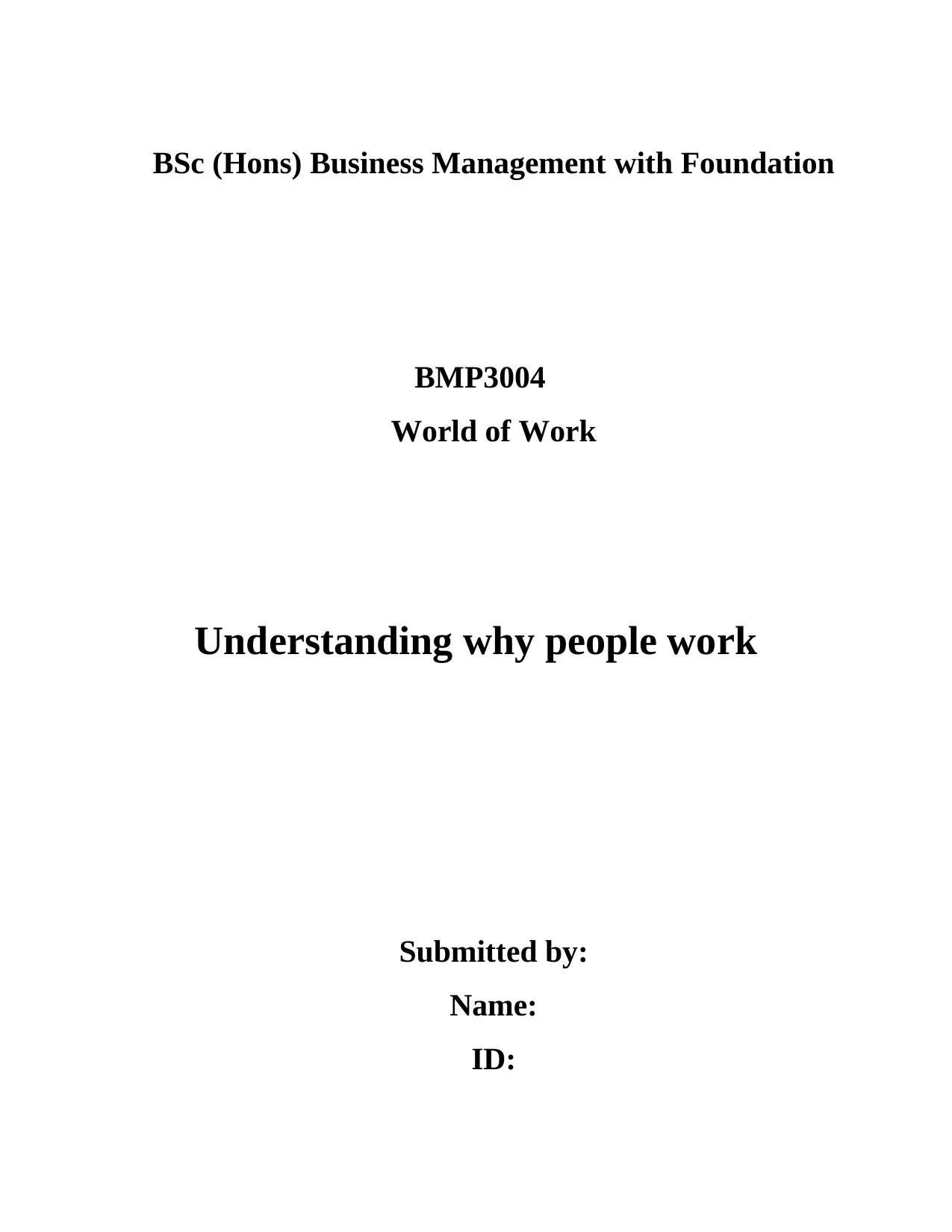
BSc (Hons) Business Management with Foundation
BMP3004
World of Work
Understanding why people work
Submitted by:
Name:
ID:
BMP3004
World of Work
Understanding why people work
Submitted by:
Name:
ID:
Paraphrase This Document
Need a fresh take? Get an instant paraphrase of this document with our AI Paraphraser
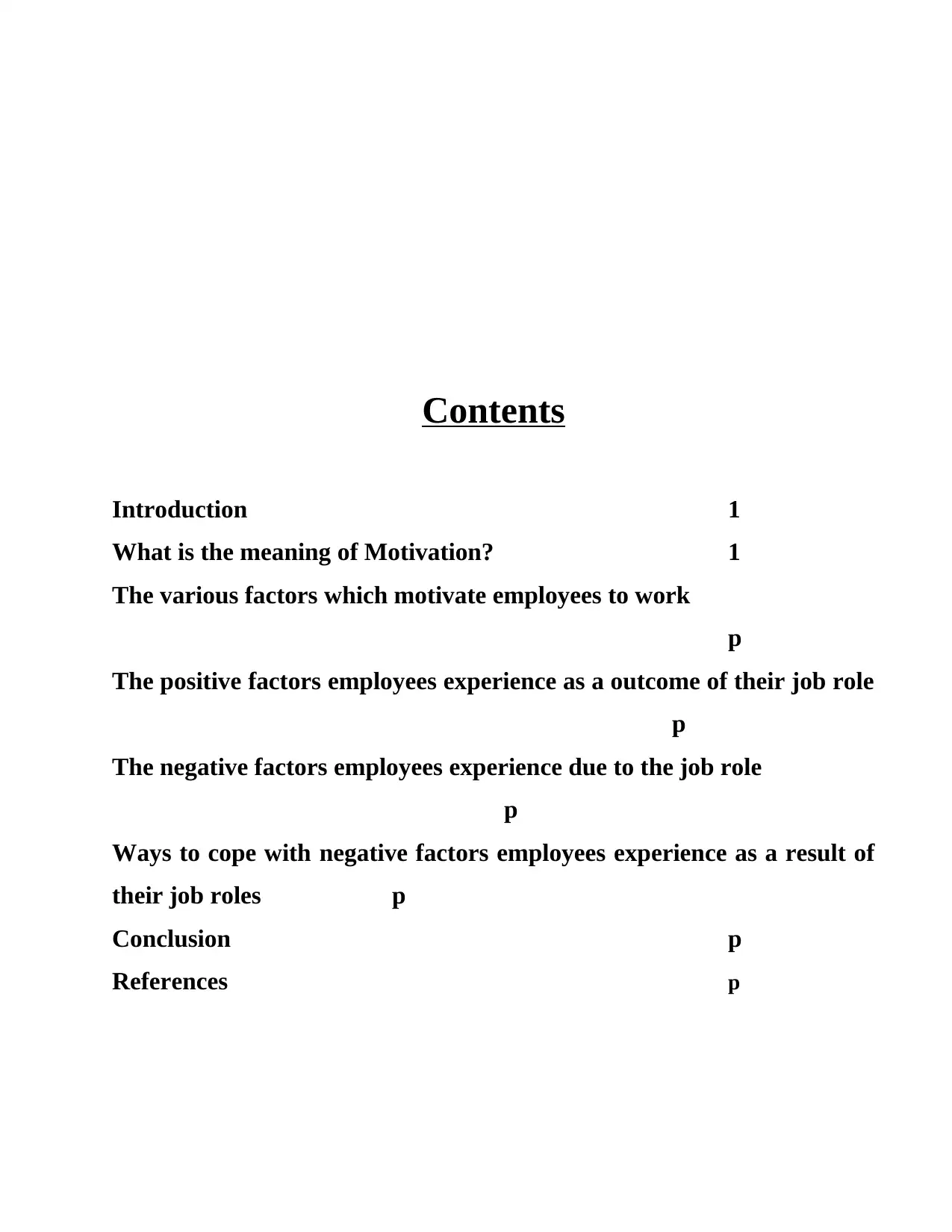
Contents
Introduction 1
What is the meaning of Motivation? 1
The various factors which motivate employees to work
p
The positive factors employees experience as a outcome of their job role
p
The negative factors employees experience due to the job role
p
Ways to cope with negative factors employees experience as a result of
their job roles p
Conclusion p
References p
Introduction 1
What is the meaning of Motivation? 1
The various factors which motivate employees to work
p
The positive factors employees experience as a outcome of their job role
p
The negative factors employees experience due to the job role
p
Ways to cope with negative factors employees experience as a result of
their job roles p
Conclusion p
References p
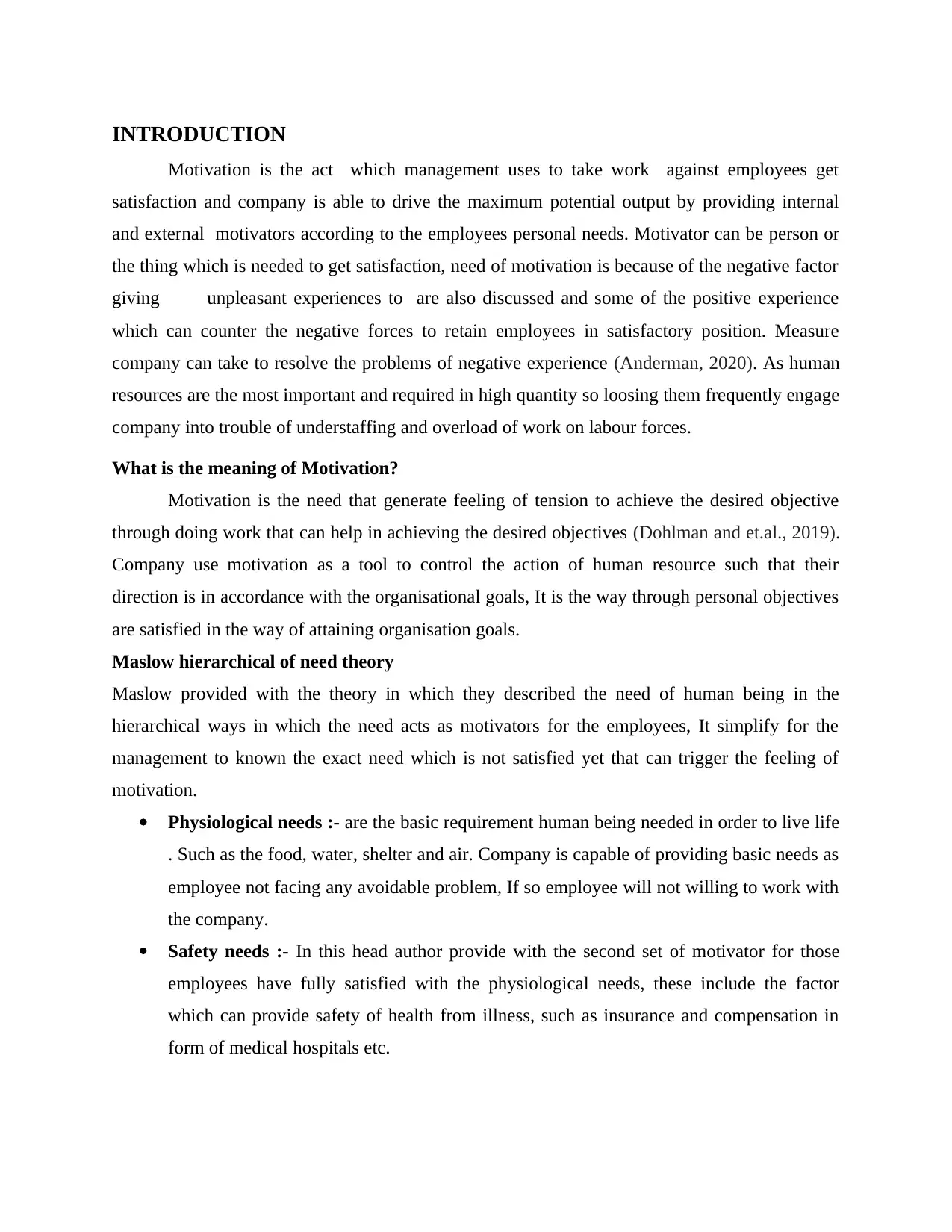
INTRODUCTION
Motivation is the act which management uses to take work against employees get
satisfaction and company is able to drive the maximum potential output by providing internal
and external motivators according to the employees personal needs. Motivator can be person or
the thing which is needed to get satisfaction, need of motivation is because of the negative factor
giving unpleasant experiences to are also discussed and some of the positive experience
which can counter the negative forces to retain employees in satisfactory position. Measure
company can take to resolve the problems of negative experience (Anderman, 2020). As human
resources are the most important and required in high quantity so loosing them frequently engage
company into trouble of understaffing and overload of work on labour forces.
What is the meaning of Motivation?
Motivation is the need that generate feeling of tension to achieve the desired objective
through doing work that can help in achieving the desired objectives (Dohlman and et.al., 2019).
Company use motivation as a tool to control the action of human resource such that their
direction is in accordance with the organisational goals, It is the way through personal objectives
are satisfied in the way of attaining organisation goals.
Maslow hierarchical of need theory
Maslow provided with the theory in which they described the need of human being in the
hierarchical ways in which the need acts as motivators for the employees, It simplify for the
management to known the exact need which is not satisfied yet that can trigger the feeling of
motivation.
Physiological needs :- are the basic requirement human being needed in order to live life
. Such as the food, water, shelter and air. Company is capable of providing basic needs as
employee not facing any avoidable problem, If so employee will not willing to work with
the company.
Safety needs :- In this head author provide with the second set of motivator for those
employees have fully satisfied with the physiological needs, these include the factor
which can provide safety of health from illness, such as insurance and compensation in
form of medical hospitals etc.
Motivation is the act which management uses to take work against employees get
satisfaction and company is able to drive the maximum potential output by providing internal
and external motivators according to the employees personal needs. Motivator can be person or
the thing which is needed to get satisfaction, need of motivation is because of the negative factor
giving unpleasant experiences to are also discussed and some of the positive experience
which can counter the negative forces to retain employees in satisfactory position. Measure
company can take to resolve the problems of negative experience (Anderman, 2020). As human
resources are the most important and required in high quantity so loosing them frequently engage
company into trouble of understaffing and overload of work on labour forces.
What is the meaning of Motivation?
Motivation is the need that generate feeling of tension to achieve the desired objective
through doing work that can help in achieving the desired objectives (Dohlman and et.al., 2019).
Company use motivation as a tool to control the action of human resource such that their
direction is in accordance with the organisational goals, It is the way through personal objectives
are satisfied in the way of attaining organisation goals.
Maslow hierarchical of need theory
Maslow provided with the theory in which they described the need of human being in the
hierarchical ways in which the need acts as motivators for the employees, It simplify for the
management to known the exact need which is not satisfied yet that can trigger the feeling of
motivation.
Physiological needs :- are the basic requirement human being needed in order to live life
. Such as the food, water, shelter and air. Company is capable of providing basic needs as
employee not facing any avoidable problem, If so employee will not willing to work with
the company.
Safety needs :- In this head author provide with the second set of motivator for those
employees have fully satisfied with the physiological needs, these include the factor
which can provide safety of health from illness, such as insurance and compensation in
form of medical hospitals etc.
⊘ This is a preview!⊘
Do you want full access?
Subscribe today to unlock all pages.

Trusted by 1+ million students worldwide
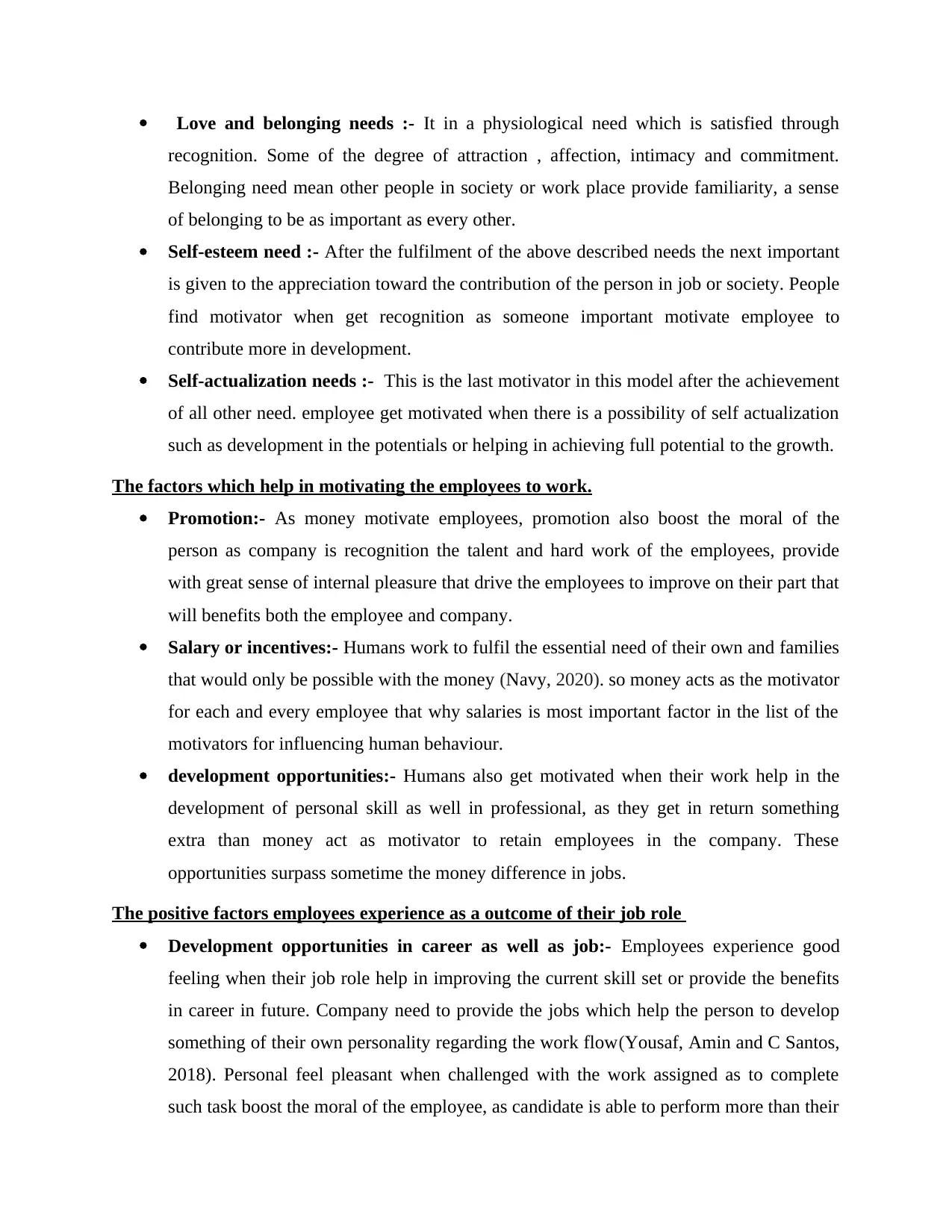
Love and belonging needs :- It in a physiological need which is satisfied through
recognition. Some of the degree of attraction , affection, intimacy and commitment.
Belonging need mean other people in society or work place provide familiarity, a sense
of belonging to be as important as every other.
Self-esteem need :- After the fulfilment of the above described needs the next important
is given to the appreciation toward the contribution of the person in job or society. People
find motivator when get recognition as someone important motivate employee to
contribute more in development.
Self-actualization needs :- This is the last motivator in this model after the achievement
of all other need. employee get motivated when there is a possibility of self actualization
such as development in the potentials or helping in achieving full potential to the growth.
The factors which help in motivating the employees to work.
Promotion:- As money motivate employees, promotion also boost the moral of the
person as company is recognition the talent and hard work of the employees, provide
with great sense of internal pleasure that drive the employees to improve on their part that
will benefits both the employee and company.
Salary or incentives:- Humans work to fulfil the essential need of their own and families
that would only be possible with the money (Navy, 2020). so money acts as the motivator
for each and every employee that why salaries is most important factor in the list of the
motivators for influencing human behaviour.
development opportunities:- Humans also get motivated when their work help in the
development of personal skill as well in professional, as they get in return something
extra than money act as motivator to retain employees in the company. These
opportunities surpass sometime the money difference in jobs.
The positive factors employees experience as a outcome of their job role
Development opportunities in career as well as job:- Employees experience good
feeling when their job role help in improving the current skill set or provide the benefits
in career in future. Company need to provide the jobs which help the person to develop
something of their own personality regarding the work flow(Yousaf, Amin and C Santos,
2018). Personal feel pleasant when challenged with the work assigned as to complete
such task boost the moral of the employee, as candidate is able to perform more than their
recognition. Some of the degree of attraction , affection, intimacy and commitment.
Belonging need mean other people in society or work place provide familiarity, a sense
of belonging to be as important as every other.
Self-esteem need :- After the fulfilment of the above described needs the next important
is given to the appreciation toward the contribution of the person in job or society. People
find motivator when get recognition as someone important motivate employee to
contribute more in development.
Self-actualization needs :- This is the last motivator in this model after the achievement
of all other need. employee get motivated when there is a possibility of self actualization
such as development in the potentials or helping in achieving full potential to the growth.
The factors which help in motivating the employees to work.
Promotion:- As money motivate employees, promotion also boost the moral of the
person as company is recognition the talent and hard work of the employees, provide
with great sense of internal pleasure that drive the employees to improve on their part that
will benefits both the employee and company.
Salary or incentives:- Humans work to fulfil the essential need of their own and families
that would only be possible with the money (Navy, 2020). so money acts as the motivator
for each and every employee that why salaries is most important factor in the list of the
motivators for influencing human behaviour.
development opportunities:- Humans also get motivated when their work help in the
development of personal skill as well in professional, as they get in return something
extra than money act as motivator to retain employees in the company. These
opportunities surpass sometime the money difference in jobs.
The positive factors employees experience as a outcome of their job role
Development opportunities in career as well as job:- Employees experience good
feeling when their job role help in improving the current skill set or provide the benefits
in career in future. Company need to provide the jobs which help the person to develop
something of their own personality regarding the work flow(Yousaf, Amin and C Santos,
2018). Personal feel pleasant when challenged with the work assigned as to complete
such task boost the moral of the employee, as candidate is able to perform more than their
Paraphrase This Document
Need a fresh take? Get an instant paraphrase of this document with our AI Paraphraser
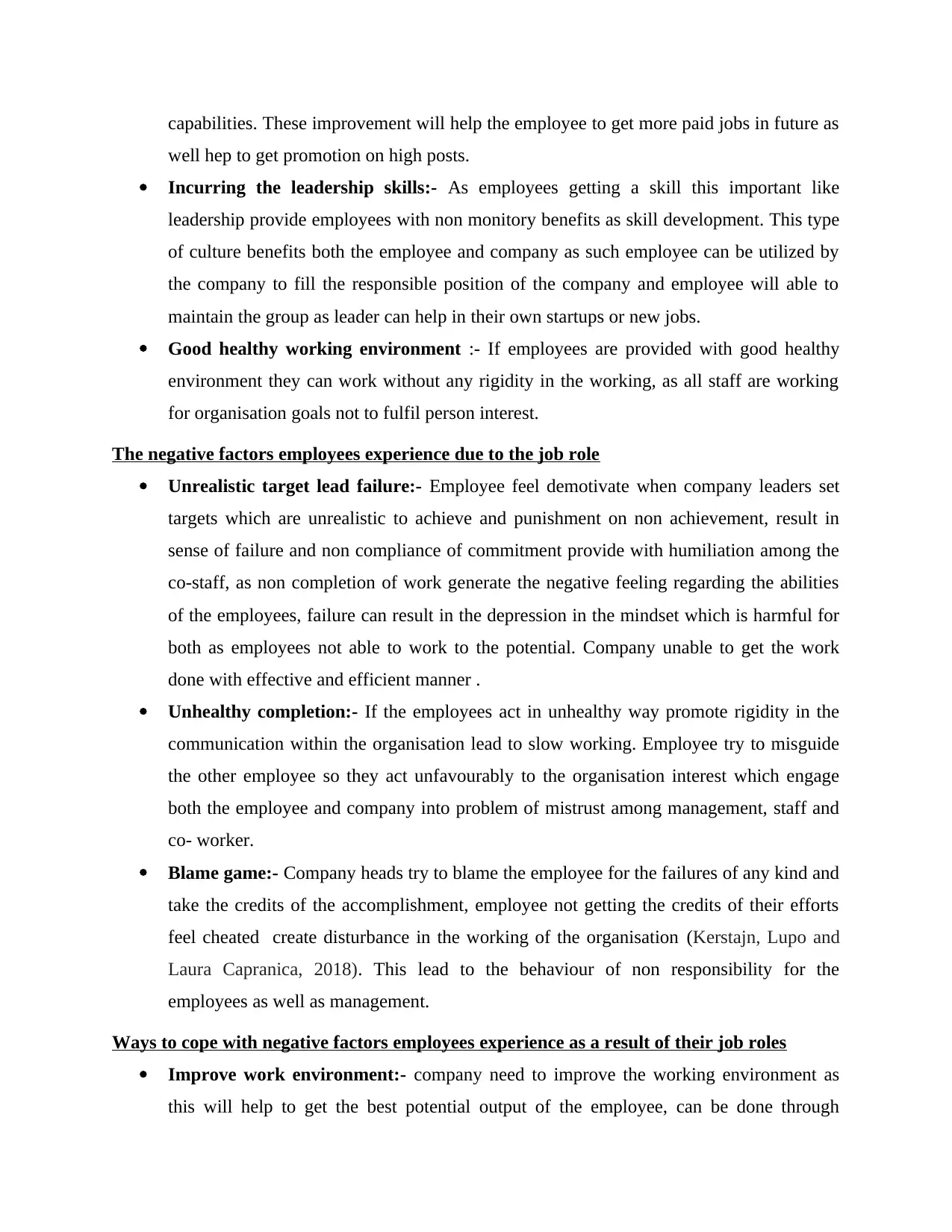
capabilities. These improvement will help the employee to get more paid jobs in future as
well hep to get promotion on high posts.
Incurring the leadership skills:- As employees getting a skill this important like
leadership provide employees with non monitory benefits as skill development. This type
of culture benefits both the employee and company as such employee can be utilized by
the company to fill the responsible position of the company and employee will able to
maintain the group as leader can help in their own startups or new jobs.
Good healthy working environment :- If employees are provided with good healthy
environment they can work without any rigidity in the working, as all staff are working
for organisation goals not to fulfil person interest.
The negative factors employees experience due to the job role
Unrealistic target lead failure:- Employee feel demotivate when company leaders set
targets which are unrealistic to achieve and punishment on non achievement, result in
sense of failure and non compliance of commitment provide with humiliation among the
co-staff, as non completion of work generate the negative feeling regarding the abilities
of the employees, failure can result in the depression in the mindset which is harmful for
both as employees not able to work to the potential. Company unable to get the work
done with effective and efficient manner .
Unhealthy completion:- If the employees act in unhealthy way promote rigidity in the
communication within the organisation lead to slow working. Employee try to misguide
the other employee so they act unfavourably to the organisation interest which engage
both the employee and company into problem of mistrust among management, staff and
co- worker.
Blame game:- Company heads try to blame the employee for the failures of any kind and
take the credits of the accomplishment, employee not getting the credits of their efforts
feel cheated create disturbance in the working of the organisation (Kerstajn, Lupo and
Laura Capranica, 2018). This lead to the behaviour of non responsibility for the
employees as well as management.
Ways to cope with negative factors employees experience as a result of their job roles
Improve work environment:- company need to improve the working environment as
this will help to get the best potential output of the employee, can be done through
well hep to get promotion on high posts.
Incurring the leadership skills:- As employees getting a skill this important like
leadership provide employees with non monitory benefits as skill development. This type
of culture benefits both the employee and company as such employee can be utilized by
the company to fill the responsible position of the company and employee will able to
maintain the group as leader can help in their own startups or new jobs.
Good healthy working environment :- If employees are provided with good healthy
environment they can work without any rigidity in the working, as all staff are working
for organisation goals not to fulfil person interest.
The negative factors employees experience due to the job role
Unrealistic target lead failure:- Employee feel demotivate when company leaders set
targets which are unrealistic to achieve and punishment on non achievement, result in
sense of failure and non compliance of commitment provide with humiliation among the
co-staff, as non completion of work generate the negative feeling regarding the abilities
of the employees, failure can result in the depression in the mindset which is harmful for
both as employees not able to work to the potential. Company unable to get the work
done with effective and efficient manner .
Unhealthy completion:- If the employees act in unhealthy way promote rigidity in the
communication within the organisation lead to slow working. Employee try to misguide
the other employee so they act unfavourably to the organisation interest which engage
both the employee and company into problem of mistrust among management, staff and
co- worker.
Blame game:- Company heads try to blame the employee for the failures of any kind and
take the credits of the accomplishment, employee not getting the credits of their efforts
feel cheated create disturbance in the working of the organisation (Kerstajn, Lupo and
Laura Capranica, 2018). This lead to the behaviour of non responsibility for the
employees as well as management.
Ways to cope with negative factors employees experience as a result of their job roles
Improve work environment:- company need to improve the working environment as
this will help to get the best potential output of the employee, can be done through
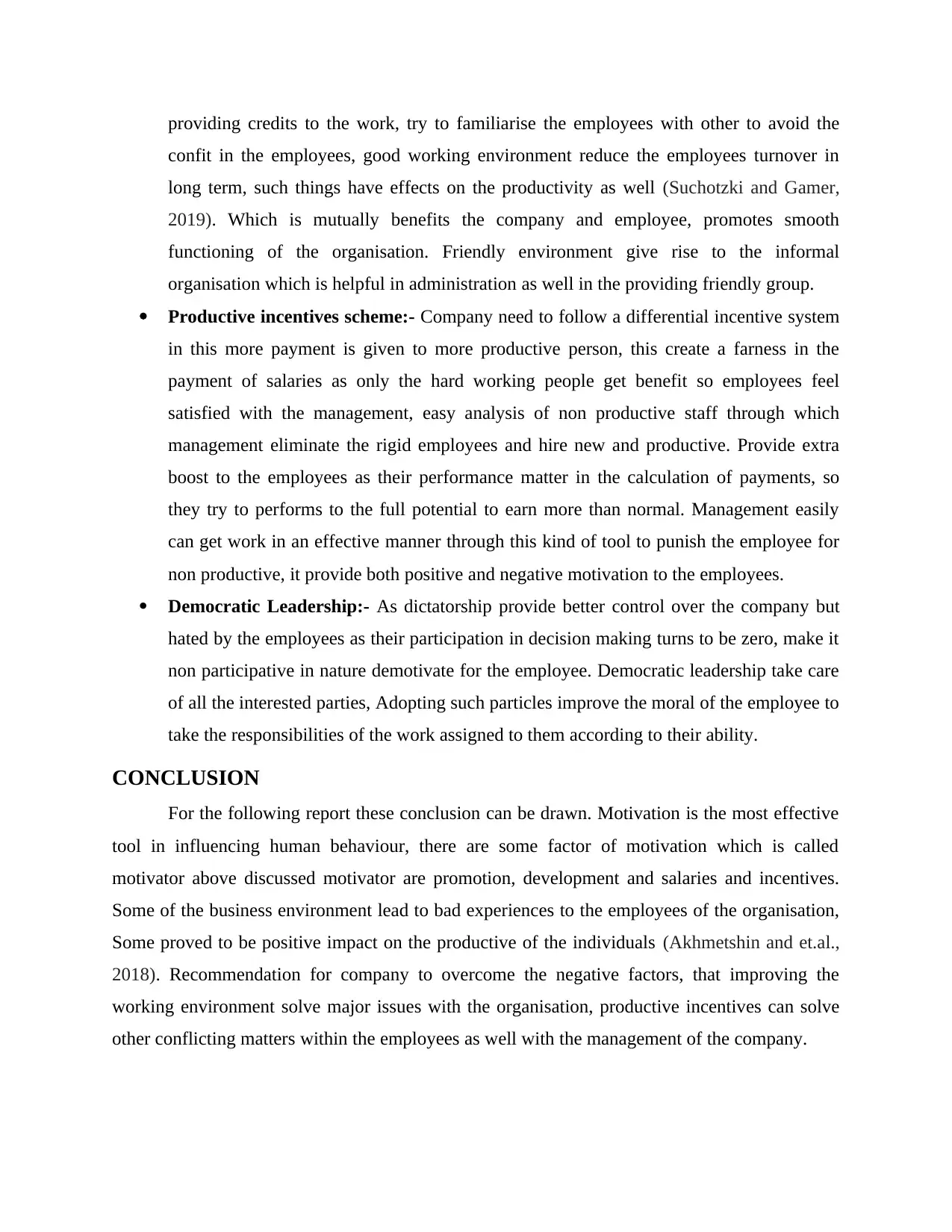
providing credits to the work, try to familiarise the employees with other to avoid the
confit in the employees, good working environment reduce the employees turnover in
long term, such things have effects on the productivity as well (Suchotzki and Gamer,
2019). Which is mutually benefits the company and employee, promotes smooth
functioning of the organisation. Friendly environment give rise to the informal
organisation which is helpful in administration as well in the providing friendly group.
Productive incentives scheme:- Company need to follow a differential incentive system
in this more payment is given to more productive person, this create a farness in the
payment of salaries as only the hard working people get benefit so employees feel
satisfied with the management, easy analysis of non productive staff through which
management eliminate the rigid employees and hire new and productive. Provide extra
boost to the employees as their performance matter in the calculation of payments, so
they try to performs to the full potential to earn more than normal. Management easily
can get work in an effective manner through this kind of tool to punish the employee for
non productive, it provide both positive and negative motivation to the employees.
Democratic Leadership:- As dictatorship provide better control over the company but
hated by the employees as their participation in decision making turns to be zero, make it
non participative in nature demotivate for the employee. Democratic leadership take care
of all the interested parties, Adopting such particles improve the moral of the employee to
take the responsibilities of the work assigned to them according to their ability.
CONCLUSION
For the following report these conclusion can be drawn. Motivation is the most effective
tool in influencing human behaviour, there are some factor of motivation which is called
motivator above discussed motivator are promotion, development and salaries and incentives.
Some of the business environment lead to bad experiences to the employees of the organisation,
Some proved to be positive impact on the productive of the individuals (Akhmetshin and et.al.,
2018). Recommendation for company to overcome the negative factors, that improving the
working environment solve major issues with the organisation, productive incentives can solve
other conflicting matters within the employees as well with the management of the company.
confit in the employees, good working environment reduce the employees turnover in
long term, such things have effects on the productivity as well (Suchotzki and Gamer,
2019). Which is mutually benefits the company and employee, promotes smooth
functioning of the organisation. Friendly environment give rise to the informal
organisation which is helpful in administration as well in the providing friendly group.
Productive incentives scheme:- Company need to follow a differential incentive system
in this more payment is given to more productive person, this create a farness in the
payment of salaries as only the hard working people get benefit so employees feel
satisfied with the management, easy analysis of non productive staff through which
management eliminate the rigid employees and hire new and productive. Provide extra
boost to the employees as their performance matter in the calculation of payments, so
they try to performs to the full potential to earn more than normal. Management easily
can get work in an effective manner through this kind of tool to punish the employee for
non productive, it provide both positive and negative motivation to the employees.
Democratic Leadership:- As dictatorship provide better control over the company but
hated by the employees as their participation in decision making turns to be zero, make it
non participative in nature demotivate for the employee. Democratic leadership take care
of all the interested parties, Adopting such particles improve the moral of the employee to
take the responsibilities of the work assigned to them according to their ability.
CONCLUSION
For the following report these conclusion can be drawn. Motivation is the most effective
tool in influencing human behaviour, there are some factor of motivation which is called
motivator above discussed motivator are promotion, development and salaries and incentives.
Some of the business environment lead to bad experiences to the employees of the organisation,
Some proved to be positive impact on the productive of the individuals (Akhmetshin and et.al.,
2018). Recommendation for company to overcome the negative factors, that improving the
working environment solve major issues with the organisation, productive incentives can solve
other conflicting matters within the employees as well with the management of the company.
⊘ This is a preview!⊘
Do you want full access?
Subscribe today to unlock all pages.

Trusted by 1+ million students worldwide
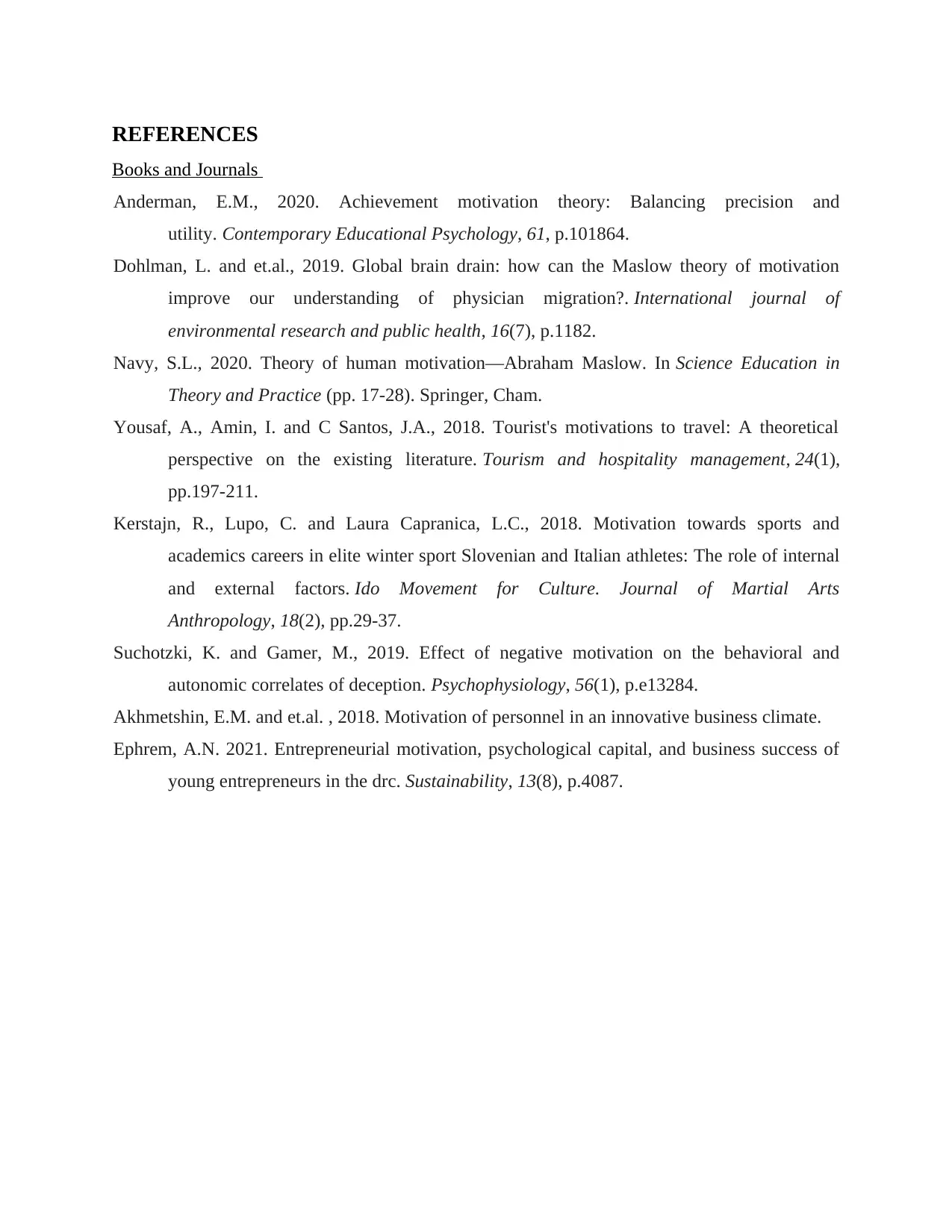
REFERENCES
Books and Journals
Anderman, E.M., 2020. Achievement motivation theory: Balancing precision and
utility. Contemporary Educational Psychology, 61, p.101864.
Dohlman, L. and et.al., 2019. Global brain drain: how can the Maslow theory of motivation
improve our understanding of physician migration?. International journal of
environmental research and public health, 16(7), p.1182.
Navy, S.L., 2020. Theory of human motivation—Abraham Maslow. In Science Education in
Theory and Practice (pp. 17-28). Springer, Cham.
Yousaf, A., Amin, I. and C Santos, J.A., 2018. Tourist's motivations to travel: A theoretical
perspective on the existing literature. Tourism and hospitality management, 24(1),
pp.197-211.
Kerstajn, R., Lupo, C. and Laura Capranica, L.C., 2018. Motivation towards sports and
academics careers in elite winter sport Slovenian and Italian athletes: The role of internal
and external factors. Ido Movement for Culture. Journal of Martial Arts
Anthropology, 18(2), pp.29-37.
Suchotzki, K. and Gamer, M., 2019. Effect of negative motivation on the behavioral and
autonomic correlates of deception. Psychophysiology, 56(1), p.e13284.
Akhmetshin, E.M. and et.al. , 2018. Motivation of personnel in an innovative business climate.
Ephrem, A.N. 2021. Entrepreneurial motivation, psychological capital, and business success of
young entrepreneurs in the drc. Sustainability, 13(8), p.4087.
Books and Journals
Anderman, E.M., 2020. Achievement motivation theory: Balancing precision and
utility. Contemporary Educational Psychology, 61, p.101864.
Dohlman, L. and et.al., 2019. Global brain drain: how can the Maslow theory of motivation
improve our understanding of physician migration?. International journal of
environmental research and public health, 16(7), p.1182.
Navy, S.L., 2020. Theory of human motivation—Abraham Maslow. In Science Education in
Theory and Practice (pp. 17-28). Springer, Cham.
Yousaf, A., Amin, I. and C Santos, J.A., 2018. Tourist's motivations to travel: A theoretical
perspective on the existing literature. Tourism and hospitality management, 24(1),
pp.197-211.
Kerstajn, R., Lupo, C. and Laura Capranica, L.C., 2018. Motivation towards sports and
academics careers in elite winter sport Slovenian and Italian athletes: The role of internal
and external factors. Ido Movement for Culture. Journal of Martial Arts
Anthropology, 18(2), pp.29-37.
Suchotzki, K. and Gamer, M., 2019. Effect of negative motivation on the behavioral and
autonomic correlates of deception. Psychophysiology, 56(1), p.e13284.
Akhmetshin, E.M. and et.al. , 2018. Motivation of personnel in an innovative business climate.
Ephrem, A.N. 2021. Entrepreneurial motivation, psychological capital, and business success of
young entrepreneurs in the drc. Sustainability, 13(8), p.4087.
1 out of 7
Related Documents
Your All-in-One AI-Powered Toolkit for Academic Success.
+13062052269
info@desklib.com
Available 24*7 on WhatsApp / Email
![[object Object]](/_next/static/media/star-bottom.7253800d.svg)
Unlock your academic potential
Copyright © 2020–2026 A2Z Services. All Rights Reserved. Developed and managed by ZUCOL.



